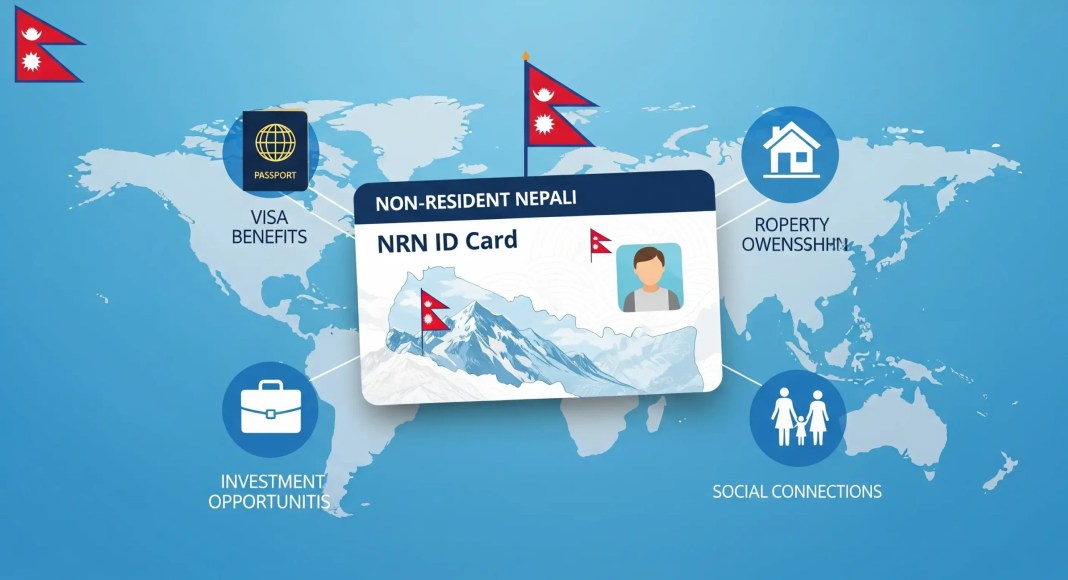The NRN ID Card serves Nepalis living abroad and foreign citizens of Nepali origin. This guide covers its definition, eligibility, application process, benefits, costs, drawbacks, and factors to consider when deciding if it fits your needs.
What is an NRN ID Card?
The NRN ID Card identifies non-resident Nepalis. It applies to two groups: Nepalese Citizens Residing Abroad (NCRA) and Foreign Citizens of Nepalese Origin (FCNO). The card grants rights for investment, property ownership, and stays in Nepal under the Non-Resident Nepalese Act, 2064. It has a validity of 10 years and requires renewal through a similar process.
Who is Eligible for an NRN ID Card?
Eligibility includes:
- NCRA: Nepalese citizens living outside Nepal for work, study, or other reasons.
- FCNO: Individuals who renounced Nepalese citizenship or their descendants.
Applicants register under Section 3 of the Non-Resident Nepalese Act. Foreign nationals of Nepali origin qualify if they provide proof of ancestry.
How to Apply for an NRN ID Card
The application process occurs online and through embassies or the Ministry of Foreign Affairs (MOFA):
- Sign up on the MOFA portal at nrn.mofa.gov.np.
- Select FCNO or NCRA category.
- Complete and print the form.
- Submit the form with documents to MOFA or the nearest Nepalese embassy/consulate.
- Await verification and issuance.
No travel to Nepal is required for submission.
Required documents for NCRA:
- Signed online application form.
- Original and copy of Nepalese citizenship certificate.
- Copy of Nepalese passport biographic page.
- Proof of business or work in the current country.
For FCNO:
- Signed online application form.
- Copy of current country’s citizenship or birth certificate.
- Copy of current passport.
- Proof of relationship to Nepali citizen if applicable.
- Proof of profession or business.
Processing times vary, such as 3 working days for approval in some consulates.
Key Benefits of the NRN ID Card
The card provides access to several areas:
Visa and Entry Benefits
NRN card holders receive a gratis tourist visa on arrival, extendable up to one year at no cost through the Department of Immigration. They must obtain an NRN visa for stays in Nepal.
Economic and Investment Benefits
- Investment in real estate, companies, and stock market with reduced restrictions.
- Repatriation of earnings from investments or property without limits.
- Ownership of property, including land, subject to caps.
- Preferential treatment in sectors like tourism, hydropower, IT, agriculture, manufacturing, healthcare, and education.
- Access to foreign currency and Nepali rupee bank accounts.
- Tax incentives on investments and profit repatriation.
- Streamlined business registration and higher foreign investment limits.
Social and Family Benefits
- Recognition as part of the Nepali community.
- Participation in NRN networks and conferences.
- Visa sponsorship for spouses and dependents.
- Educational access for children at local rates in Nepali institutions.
- Healthcare access through public systems and national insurance enrollment.
Employment and Legal Benefits
- Work in self-owned businesses or as executives in NRN-invested companies.
- Legal protections against expropriation, dispute resolution, and IP rights.
- Voluntary contributions to national pension funds.
Costs and Fees
Fees depend on category:
- NCRA: $70 USD.
- FCNO: $520 USD.
Fees may vary by country of residence. Additional costs include document preparation or consultant services.
Potential Drawbacks
- No voting rights in Nepali elections for FCNO holders; NCRA holders must return to Nepal to vote.
- Property ownership limits in strategic, border, or protected areas.
- Employment restrictions in government positions and protected professions.
- Not equivalent to Nepali citizenship; Nepal does not allow dual citizenship.
- Higher fees for FCNO applicants.
- Renewal every 10 years repeats the application process.
Compared to NRN Citizenship, the ID card offers fewer long-term rights, such as no political participation.
Is the NRN ID Card Worth It for You?
Decide based on your situation:
- If you plan investments, property purchases, or extended stays in Nepal, the benefits in economic access and visa extensions justify the cost.
- For occasional visits without business interests, standard visas may suffice.
- FCNO applicants face higher fees, so evaluate against needs for repatriation or family sponsorship.
- Consider NRN Citizenship for broader rights if eligible, as it provides economic, social, and cultural benefits without political rights.
Assess your frequency of Nepal interactions and long-term plans.
Conclusion
The NRN ID Card connects non-resident Nepalis to their origin country through practical benefits. It supports investment and stays but includes limitations. Review your eligibility and needs before applying.
FAQs
What is the difference between NRN ID Card and NRN Citizenship?
The ID Card provides identification and specific benefits like investment rights. NRN Citizenship offers similar economic rights but is a formal status for those who renounced citizenship, without political rights.
How long does it take to get an NRN ID Card?
Processing can take 3-4 working days in some consulates after submission.
Can I apply for an NRN ID Card online?
Yes, the initial form is online, but documents submit to an embassy or MOFA.
Do NRN ID Card holders need a visa to enter Nepal?
They receive a gratis visa on arrival, extendable to one year.
What happens if my NRN ID Card expires?
Renew it through the same process before expiration to maintain benefits.


